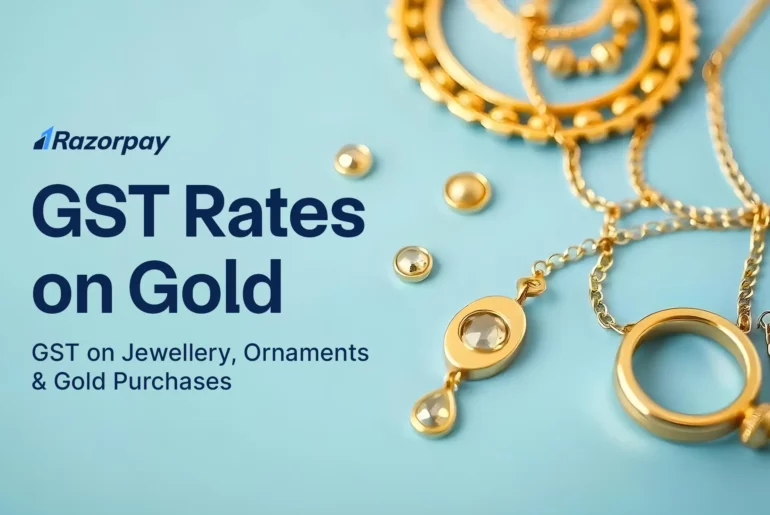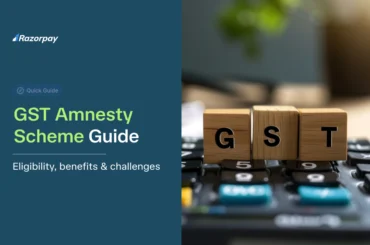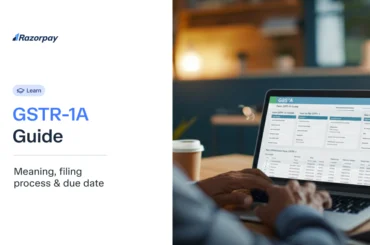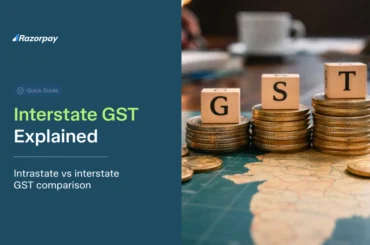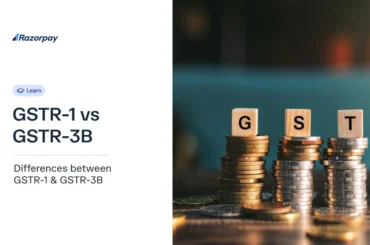Table of Contents
Latest Update in GST on Gold in India
As per the Union Budget 2024-2025, the Government of India has reduced customs duties on gold and silver to 6% from the previous 15%.
The overall custom duty on Gold has been lowered from 15% to 6% with the basic customs duty on Gold reduced from 10% to 5%, and the Agriculture Infrastructure and Development Cess reduced from 5% to 1%.
This adjustment in custom duty and cess has effectively reduced the overall taxes on gold and silver to 6% from the previous 15%, including GST. Following the new policy, domestic gold prices had plunged for the week.
What is GST on Gold in India?
GST on gold in India is set at a 3% rate, which applies to the value of gold, gold jewellery, gold coins and gold bars.
Under Section 7 of the CGST Act, the supply of gold (without any job work) is considered the supply of goods. GST on gold is as follows:
Particulars |
HSN Code |
GST Rate |
| (1) Precious stones (other than diamonds) and semi-precious stones, whether or not worked or graded but not strung, mounted or set
(2) Ungraded precious stones (other than diamonds) and semi-precious stones, temporarily strung for convenience of transport (includes synthetic or reconstructed stones, apart from unworked or simply sawn or roughly shaped) |
7103, 7104 | 0.25% |
| Diamond, gold, pearls, silver, or articles of jewellery of silver or gold, and so on, including synthetic or reconstructed stones, unworked or simply sawn or roughly shaped | 7101, 7102, 7106, 7107, 7108, 7109, 7111, 7113, 7114, 7116, 7118 | 3% |
| Job work in relation to cut and polished diamonds, plain or studded jewellery of gold, silver and so on | 9988 | 1.5% |
Related Read: Understanding GST on Diamond Jewellery
GST Rate on Purchase of Gold in India
The GST rate on gold in India is set at 3% (1.5% CGST + 1.5% SGST) on the value of gold. For example, on a gold purchase worth ₹1,00,000, the total GST payable is ₹3,000. This gold GST rate applies to all forms of gold, including jewellery, coins, and bars. Additionally, a 5% GST is applicable on making charges for gold jewellery.
The current 3% gold GST rate replaced the earlier tax structure of 1% VAT and 1% service tax under the pre-GST regime, simplifying taxation and standardizing rates for gold transactions across the country.
24 Carat Gold GST Rate in India in 2026
24-carat gold GST rate in India is 3% of the gold’s value. This means that for every Rs. 100 worth of 24-carat gold purchased, you will pay an additional Rs. 3 as GST on gold jewellery. It’s essential to note that this is the GST rate on the gold itself. Any making charges applied to the gold when creating jewellery will attract a separate GST of 5%.
22 Carat Gold GST Rate in India in 2026
22-carat gold GST rate in India is 3% of the gold’s value. This means that for every Rs. 1000 worth of 24-carat gold purchased, you will pay an additional Rs. 30 as GST. The making charges for any jewellery created using 22-carat gold will attract a separate GST of 5%.
It’s crucial to understand that the purity of the gold doesn’t affect the GST rate. The tax is levied on the value of the gold, regardless of its purity.
GST on Physical Gold Purchase
GST rate on physical gold purchase is 3%, including gold bars and coins. This tax is calculated on the total value of the gold purchased, without any additional charges. Let us understand this in detail:
GST on Ready-Made Jewellery (Ornaments)
When purchasing ready-made gold jewellery, consumers pay a 3% GST on the total value of the jewellery. This includes both the price of the gold and the making charges. It’s important to note that this is considered a composite supply, meaning the gold and the craftsmanship are treated as a single product for taxation purposes.
GST on Gold Bars and Coins
For gold bars and coins, the GST rate is also 3%, but it’s applied solely to the value of the gold itself. Since there are no additional services or making charges involved, the tax calculation is straightforward.
GST on Second-Hand Gold
The GST treatment for second-hand gold varies depending on whether the seller is a registered dealer or an individual.
- Registered Dealers: When a registered dealer sells second-hand gold, GST rate of 3% is applicable on the sale price.
- Individuals: Individuals selling second-hand gold generally don’t pay GST, as they are not considered businesses. However, the buyer (usually a registered jeweller) will be liable for GST on the purchase.
GST Rate on Gold Jewellery Making Charges
GST on Custom-Made Jewellery
When customers provide their gold for making custom jewellery, the process involves two separate GST components:
- GST on gold: The 3% GST applies to the value of the gold provided by the customer.
- GST on making charges: A 5% GST is levied on the making charges incurred by the customer.
Example: If you provide 10 grams of gold worth Rs. 50,000 and the making charges are Rs. 10,000, you will pay:
- GST on gold: Rs. 1,500 (3% of Rs. 50,000)
- GST on making charges: Rs. 500 (5% of Rs. 10,000)
- Total GST: Rs. 2,000
Reverse Charge Mechanism
If the goldsmith or specialist is not registered under GST, the gold merchant or jeweller is responsible for paying the 5% GST on the making charges under the reverse charge mechanism.
Jewellery Repairs
GST at a rate of 5% is applied to the charges for repairing jewellery. This rate is separate from the GST applied to the purchase of ready-made jewellery.
You can also calculate the Pre-GST and Post-GST amount with Razorpay’s GST Calculator.
Know more about: GST registration online for small business
GST Calculation on Gold Purchase
Here is how GST is calculated on gold purchase:
| Type of Transaction | Tax Rate |
| Import of gold | 12.5% customs duty on value of gold imported |
| Gold jewellery making charges | 5% GST on making charges |
| GST on Gold Purchase | 3% on value of gold purchased |
Example Calculation of GST on Gold in 2026
Now let us understand how GST is applicable on gold with a detailed example:
Section |
Particulars |
Under GST (Not as a composite supply*) (₹) |
Under GST (As a composite supply**) (₹) |
| A | Base price of 10 gm gold (Assumed) | 120000 | 120000 |
| B | Customs duty (6%) | 7200 | 7200 |
| C | Assessable value for GST | 127200 | 127200 |
| D | CGST on gold at 3% (Not as a composite supply) | 3816 | Not Applicable |
| E | Total value of gold | 131016 | 127200 |
| F | Making charges at 6% (Assumed On base price+customs duty) | 7920 | 7920 |
| G | Assessable value for GST | 138936 | 135120 |
| H | EGST on making charges at 5% | 396 | Not Applicable |
| I | FGST on gold jewellery at 3% (For composite supply) | Not Applicable | 4054 |
| J | Total Price of Gold Jewellery Purchase (A+B+C+D+E+F+G+H+I) | 143147 | 141574 |
*Not as a composite supply: Treats the gold purchase and the making charges as two separate supplies.
**As a composite supply: Treats the gold purchase and the making charges as a single, bundled supply.
Note: The values in this example are for illustrative purposes only and may not reflect actual market conditions or government regulations.
GST on Gold Investment Schemes
Investing in gold has been a popular choice for Indians for generations. With the introduction of various investment avenues, understanding the GST implications is crucial.
GST on Gold ETFs (Exchange-Traded Funds)
- GST Applicability: Gold ETFs are generally exempt from GST. The underlying gold asset itself is subject to GST, but investors are not charged GST on the ETF units.
- Tax Implications: While there is no direct GST on ETF purchases, investors may be subject to capital gains tax when selling ETF units.
GST on Gold Mutual Funds
- GST Applicability: Similar to gold ETFs, gold mutual funds are typically exempt from GST. The underlying gold asset is subject to GST, but investors are not charged GST on the fund units.
- Tax Implications: Investors may be subject to capital gains tax and other applicable taxes on their mutual fund investments.
GST on Sovereign Gold Bonds (SGBs)
- GST Applicability: Sovereign Gold Bonds are generally exempt from GST. Unlike on physical gold, the GST on SGB is only applicable to the brokerage you pay. While investing, you will have to pay GST at the flat rate of 18% on the brokerage amount.
- Tax Implications: Investors may be subject to capital gains tax on the interest earned from SGBs.
GST on Digital Gold Purchase
- GST Applicability: Digital gold platforms typically charge a 3% GST on the purchase of digital gold. This is similar to the GST charged on physical gold.
- Tax Implications: Capital gains tax may apply when selling digital gold, depending on the holding period.
GST on Gold Exemptions
At the 31st GST council meeting held on 22 December 2018, a GST exemption was granted for the supply of gold by a notified agency to registered jewellery exporters. This exemption aims to reduce the GST rates burden on gold jewellery exporters and enhance the competitiveness of India’s gold export sector in the international market.
Additionally, a 5% GST is imposed on making charges for gold jewellery. Registered jewellers can claim an Input Tax Credit (ITC) of 2% on these expenses. However, this exemption specifically benefits gold jewellery exporters, and domestic buyers do not receive any relief from this provision.
Impact of GST on Gold Rate
Gold Jewellery Pricing
GST is applied to gold jewellery either as a flat tax or a percentage of the gold value. This has caused variations in the making charges set by different jewellers, affecting the overall GST on gold coins and jewellery.
Increase in Prices
The implementation of GST made gold more expensive. The tax rate increased from 1.2% to 3%, which led to higher prices for gold. This price hike resulted in reduced demand for gold and affected the liquidity of gold investments.
Change in Import and Export
Historically, the government increased customs duties on gold to curb imports and address the widening current account deficit. However, this reduction in duties aims to lower input costs, decrease gold smuggling, stimulate domestic manufacturing, and enhance export competitiveness.
Free Trade Agreement Benefits
GST-registered importers benefit from the Free Trade Agreement with countries like South Korea, allowing them to import gold without the additional 10% customs charge. This agreement facilitates easier and cheaper gold imports for registered businesses.
Frequently Asked Questions (FAQs)
1. Is GST Applicable When Selling Old Gold?
Individuals selling their personal gold jewellery do not pay GST themselves. Instead, the GST responsibility falls on the jeweller who buys the gold. If a registered dealer sells old gold, GST applies when the jeweller resells it.
2. How Does GST on Gold Compare to Other Taxes Previously Levied?
Before GST, various taxes such as VAT, excise duty, and customs duty were levied on gold. The introduction of GST simplified the tax structure by consolidating these multiple taxes into a single tax rate. Currently, GST is levied at 3% on the value of gold and 5% on making charges, replacing the previous cumulative tax rate of around 2-2.5% and additional charges.
3. What is the GST on Gold Ornaments?
The GST on gold ornaments is 3% of the total value of the gold jewellery. This includes both the value of the gold and any making charges. Additionally, a 5% GST is applied specifically to the making charges, but this is generally included in the overall 3% GST on the final price of the jewellery.
4. Is the GST Rate on Gold the Same Across India?
The standard GST rate is 3% on gold value. This rate is charged as a total of CGST and SGST (which is 1.5% each) or just the IGST rate of 3% depending on whether the sale is intrastate or interstate respectively.
5. Can I claim Input Tax Credit (ITC) on gold purchases?
Registered jewellers can claim ITC on gold purchases, especially on making charges. However, individual buyers cannot claim ITC.
6. Does the GST rate on gold vary based on carat (e.g., 22k vs. 24k gold)?
No, the GST rate on gold is 3% regardless of whether the gold is 22-carat, 24-carat, or any other purity.
7. Is GST Applicable When Exchanging Old Gold Jewelry for New Gold Jewelry?
Generally, no GST is applicable when you exchange old gold jewelry for new gold jewelry. This is because the sale of old gold by an individual is not considered a business activity and therefore falls outside the scope of GST.
However, it’s important to note that:
- Registered jewelers: If you sell your old gold to a registered jeweler, the jeweler might be liable to pay GST on the purchase.
- Making charges: Any making charges for the new jewelry will attract a 5% GST.
8. What is the GST rate on hallmark gold jewellery?
Hallmark gold jewellery is subject to a 3% GST rate on the value of raw gold. Additionally, the making charges for hallmarked gold jewellery attract a separate GST rate of 5%. This ensures clarity in taxation for both the material and craftsmanship involved in creating the jewellery.

